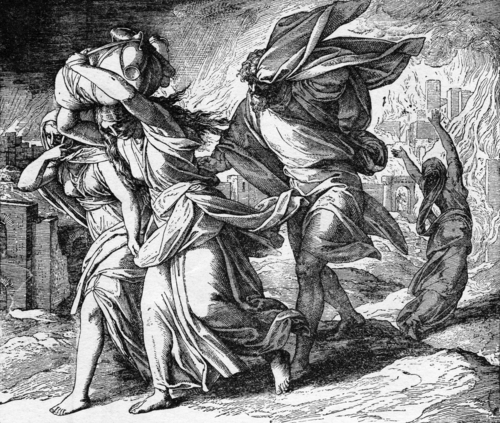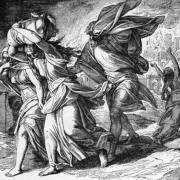Why We Need God to Speak – Exodus 20:1-3 – July 21 2021
/0 Comments/in Enduring Words for Troubled Times/by David GuzikWhat Shall We Do to These Men? – Acts 4:15-18 – July 20 2021
/0 Comments/in Enduring Words for Troubled Times/by David GuzikListen to Me – Isaiah 51:1-3 – July 19 2021
/0 Comments/in Enduring Words for Troubled Times/by David GuzikAngels Teaching Evangelism
/0 Comments/in For Pastors, Preachers, Bible Teachers/by David GuzikDear Pastor, Preacher, or Bible Teacher –
God doesn’t give angels the work of evangelism. That He leaves to His people, and especially to pastors, preachers, and Bible teachers.
Yet, angels can sometimes be an example to us of effective evangelism. We see this in Genesis 19, where two angels tried to persuade the family of Lot to escape the judgment about to come upon the cities of Sodom and Gomorrah.
When the morning dawned, the angels urged Lot to hurry,
saying, “Arise, take your wife and your two daughters who are here,
lest you be consumed in the punishment of the city.” (Genesis 19:15)

Tragically, Lot’s sons-in-law had already rejected the warning of the angels. They would be left behind as the angels urged Lot to escape the coming destruction and judgment on Sodom.
In the way they urged Lot, we see that these angels may serve as a pattern of evangelism.
They went after Lot, going to him and his house. Evangelism should be willing to pursue the lost sinner and their family.
They warned him of what was going to happen, and in plain words. As preachers, we should not be afraid to warn people about God’s coming judgment. When we do, we should speak plainly and directly.
They urged Lot, urging him to flee destruction. When we speak to others about eternal things, there should be a sense of urgency. We speak with great love, but with urgency.
Lot and his daughters survived this judgment. May God give us the energy, the wisdom, and the urgency to preach the gospel so that others may escape God’s ultimate judgment!
Blessings to you in Jesus’ Name – David Guzik
Click Here to Receive Email from David for Pastors, Preachers, and Bible Teachers
Set Free for a Purpose
/0 Comments/in Weekly Devotional/by David GuzikBut at night an angel of the Lord opened the prison doors and brought them out, and said, “Go, stand in the temple and speak to the people all the words of this life.” (Acts 5:19-20)
God was working in a powerful way through the apostles, and the religious leaders in Jerusalem didn’t like it. Acts 5:17-18 says the high priest arrested the apostles and put them all in prison.
They didn’t stay in prison long. We read: an angel of the Lord opened the prison doors. This was easy for God to arrange. Angels are all ministering spirits sent forth to minister for those who will inherit salvation (Hebrews 1:14). God sent forth this angel to minister for the apostles. Locked doors are nothing for God or for those who He uses.

To do the work, God sent an angel. Possibly, they only understood this was an angel as they looked back. Angels often come in human appearance, and it may not always be easy to recognize an angel (as in Luke 24:3-7 and Hebrews 13:2).
The angel didn’t just open doors, he also had a message: Go, stand in the temple and speak to the people all the words of this life. The angel freed them from prison, but he wasn’t going to do the work of preaching. That was up to the apostles, and it is also up to us.
Their rescue from prison was wonderful, but for a purpose – so they could continue their work. God didn’t set them free primarily for their safety or comfort. They were set free for a reason. In the future, they were not always delivered.
The later history of these apostles – and others associated with them in the early church – shows that sometimes God delivers by a miracle, sometimes He does not. According to fairly reliable church history and tradition, miraculous angels did not always deliver them.
– Matthew was beheaded with a sword.
– Mark died in Alexandria after being dragged through the streets of the city.
– Luke was hanged on an olive tree in Greece.
– John died a natural death, but they unsuccessfully tried to boil him in oil.
– Peter was crucified upside-down in Rome.
– James was beheaded in Jerusalem.
– James the Less was thrown from a height then beaten with clubs.
– Philip was hanged.
– Bartholomew was whipped and beaten until death.
– Andrew was crucified and preached at the top of his voice to his persecutors until he died.
– Thomas was run through with a spear.
– Jude was killed with the arrows of an executioner.
– Matthias was stoned and then beheaded – as was Barnabas.
– Paul was beheaded in Rome.
This reminds us that we should trust God for miraculous things and wish to see them more and more; but we do this knowing that God also has a purpose when He does not deliver with a miraculous hand. We also see that we, like the apostles, are set free for a purpose – not merely to live for ourselves.
Milagros extraños
/0 Comments/in Devocional Semanal/by David GuzikTanto que sacaban los enfermos a las calles, y los ponían en camas y lechos, para que al pasar Pedro, a lo menos su sombra cayese sobre alguno de ellos. Y aun de las ciudades vecinas muchos venían a Jerusalén, trayendo enfermos y atormentados de espíritus inmundos; y todos eran sanados (Hechos 5:15-16).
Estos primeros capítulos del libro de los Hechos cuentan la historia de los asombrosos primeros años de la iglesia, la comunidad de los discípulos de Jesús. Hasta este punto no se habían expandido mucho más allá de Jerusalén y era una temporada de una obra asombrosa de Dios.
Había milagros asombrosos y extraños. Las personas sacaban los enfermos a las calles. La gente estaba tan convencida de la realidad y el poder de lo que creían los cristianos, que pensaban que podían curarse con el mero toque de la sombra de Pedro.

Eso es lo que dice Hechos 5:15: que al pasar Pedro, a lo menos su sombra cayese sobre alguno de ellos. Note que no dice específicamente que las personas eran sanadas por la sombra de Pedro; simplemente nos dice que la gente pensaba que así sería y que tomaban medidas basadas en esta creencia. No sabemos con certeza si las personas se curaron realmente cuando la sombra de Pedro pasó sobre ellas.
En este caso, aparentemente incluso la sombra de Pedro se convirtió en un punto de contacto donde las personas liberaran fe en Jesús como sanador. Parece que la gente entendió bien lo que dijo Pedro en Hechos 3:12-16: que Jesús sana, incluso si hace Su obra de sanación a través de Sus apóstoles.
Puede parecernos una locura que alguien pueda ser curado por el toque de una sombra, pero sabemos que un toque de la ropa de Jesús curó a una mujer (Lucas 8:44). No había nada mágico en la prenda, pero fue una forma de liberar su fe. Del mismo modo, no había poder en la propia sombra de Pedro, pero había poder cuando una persona creía en Jesús para sanarlos, y el paso de la sombra de Pedro puede haber ayudado a algunos a creer.
Independientemente de cómo Dios eligiera traer la sanidad, no hay duda de que estuvo presente una obra notable, tanto que todos eran sanados. No debemos perdernos la conexión entre la pureza preservada en la primera parte de Hechos 5 (con la muerte de Ananías y el temor de Dios entre los cristianos) y el poder que se muestra aquí. Dios bendijo una iglesia pura, con poder espiritual.
Note que de las ciudades vecinas muchos venían a Jerusalén. Note que se trataba de personas que venían a Jerusalén en lugar de que los apóstoles fueran a ellos. Esto era emocionante, pero no exactamente de acuerdo con el mandato de Jesús. Él les dijo a los discípulos que salieran a Jerusalén, a toda Judea y Samaria, y hasta los confines de la tierra (Hechos 1:8). Los apóstoles no abandonaron Jerusalén hasta que fueron forzados por la persecución.
¡Con todos los milagros que estaban sucediendo, tal vez necesitaban un milagro mayor de obediencia a Jesús!





